It is clear that artificial intelligence (AI) is one of the most important technological developments of our time. But just what impact will it have on our world? How will it affect the global economy? What legal and Intellectual Property (IP) issues may arise as a result?
On April 18, a seminar entitled “Legal and IP Issues in Cutting Edge Artificial Intelligence Industry and Markets” was held in Taipei to take a closer look at these questions. The event was organized by Wispro Technology Consulting Corporation, Fronteo, and Perkins Coie LLP.
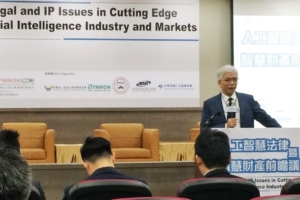
Y.P. Jou, Chief Managing Partner of Wispro, welcomed the 200-plus attendees with opening remarks. He was joined by Johnny C. Chiu, a partner at Perkins Coie, Linda Liao, the general manager of Fronteo Taiwan, and Dr. Wei-Kai Cheng, an associate professor of Computer Science at Chung Yuan Christian University, in welcoming the attendees to the event.
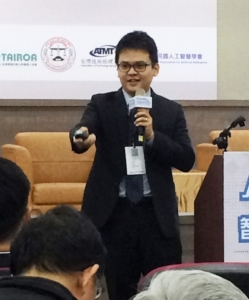
In the first segment of the program, Jackson Lin of Wispro spoke on “Deploying AI IP and Managing IP Patent Risk.” Lin began by looking at how AI companies, such as DeepMind, SenseTime, and Appier, have deployed their patents. He then continued on by discussing how an IP portfolio focused on AI innovation should be deployed, giving certain factors that should be considered, such as patent quality vs. value, and whether the patents are to be protected, enforced, or monetized. The presentation then looked at managing AI patent risk, and Lin introduced Quality Insights, a product from Patentcloud, a patent intelligence platform. Quality Insights itself uses AI technology to provide a complete overview of a patent in just one click, including a summary of prosecution and post-grant proceedings at a glance, and it delivers the Top 50 most relevant prior art thanks to a proprietary Semantic Search algorithm.
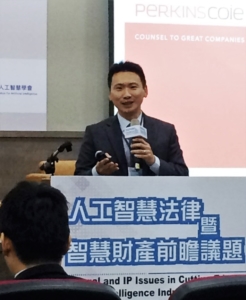
Harvey Chen, counsel at Perkins Coie, delivered a speech entitled “Artificial Intelligence in Alice’s Wonderland,” a reference to the famous Alice Corp. v. CLS Bank International case. In his presentation, Chen laid out the framework for how AI can be patented, taking a closer look at 35 U.S.C. § 101 – two-step eligibility determination (MPEP 2106). Chen then looked at recent cases involving software and AI technology, noting the “survivors, wanderers, and fumblers” and touching on why some have achieved success while others have failed in their quest to secure a patent. The presentation concluded with a reminder that Alice should always be kept in mind, particularly early on, in cases involving AI or new technology.
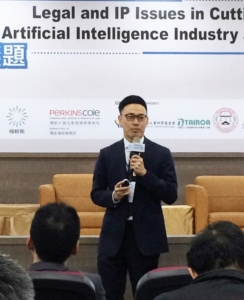
In the first segment of the program, Jackson Lin of Wispro spoke on “Deploying AI IP and Managing IP Patent Risk.” Lin began by looking at how AI companies, such as DeepMind, SenseTime, and Appier, have deployed their patents. He then continued on by discussing how an IP portfolio focused on AI innovation should be deployed, giving certain factors that should be considered, such as patent quality vs. value, and whether the patents are to be protected, enforced, or monetized. The presentation then looked at managing AI patent risk, and Lin introduced Quality Insights, a product from Patentcloud, a patent intelligence platform. Quality Insights itself uses AI technology to provide a complete overview of a patent in just one click, including a summary of prosecution and post-grant proceedings at a glance, and it delivers the Top 50 most relevant prior art thanks to a proprietary Semantic Search algorithm.
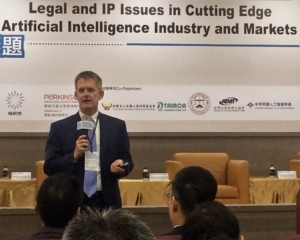
After a short break, Perkins Coie partner Johnny Chiu returned to introduce the next series of speakers, who were all from Perkins Coie and had traveled from America to Taiwan for the seminar.
Jon Jacobs spoke first. With 27 years of experience at the U.S. Department of Justice, Antitrust Division, he was particularly well suited to speak about “Artificial Intelligence and the Antitrust Implications of Using Pricing Algorithms.” After an overview of relevant U.S. antitrust laws and an overview of algorithms in general, Jacobs zeroed in on how businesses can use algorithms to set prices. Citing five scenarios involving antitrust and algorithms, Jacobs went through each one, adding examples from cases to bring his explanations to life. In the presentation’s key takeaways, Jacobs provided some do’s (“Use algorithms if they make sense for your company.” “Regularly monitor any prices set by algorithms.”) and don’ts (“Don’t agree or communicate with competitors about: price levels, pricing formulas, or which algorithms to use.”) And in a final section on unanswered questions, a very interesting question about machine learning and the possibility of two algorithms working together to fix prices on their own, without any human involvement, was raised.
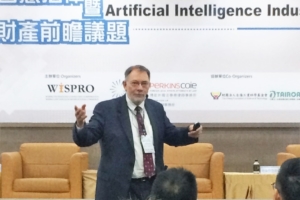
In the next presentation, which was entitled “Negligent Design of Software and Algorithms: to Err Is No Longer Only for Humans,” Craig Allely began by raising the question of whether software is a good or service, noting that software is not expressly covered in the U.S.’s Uniform Commercial Code (UCC) and that American courts have differed on just how to classify it. The presentation then focused on what happens when things go wrong and the basis of responsibility, including contract/breach of warranty, negligence, and defective products. A case involving a self-driving car that caused an accident was examined, and it was mentioned that a product can be considered to “defectively designed” if the product’s benefits are outweighed by the risks, or if the product fails to perform as expected by an ordinary consumer. In this case, since studies have shown that consumers expect self-driving cars to be safer than human-driven cars, and in this case, the self-driving car caused an accident, could this suggest that it has been “defectively designed”? The presentation concluded with advice for AI and software developers to be sure to document any and all changes made, including upgrades and changes to the code, since this documentation can prove to be very important if a legal case ever arises. Allely also added that though while technology continues to develop rapidly, the legal system, especially in the U.S., seems to be lagging behind.
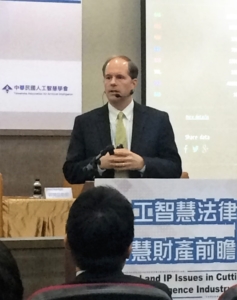
The final speaker was Kevin Feldis, a partner at Perkins Coie, who spoke on “New Technologies and New Risks: Data Protection and Cyber Corporate Compliance.” Feldis, who worked at the U.S. Department of Justice for 18 years, began his presentation by looking at some recent high-profile cases involving data breaches. Interestingly, in some cases, such as the data breach at Target, it wasn’t the company itself that was at fault, but rather a third party. In the Target case, this was a vendor that had been contracted to oversee the stores’ heating and air conditioning, and because this third party was given access to Target’s network, hackers were also able to gain access to Target’s data through this. Feldis expressed his opinion that over the past ten years, most companies have simply focused on collecting as much data as possible. Now, however, both the public and governments are starting to express concerns about this. In fact, collecting data can create a liability for companies, and companies that collect data will have to start accepting responsibility for the security of this data. The presentation concluded with some steps that companies can take to practice good “cyber hygiene.” In addition to updating their current data security program and making sure an incident response plan is in place, companies should also be very careful when working with third parties. In fact, conducting due diligence on their cyber policies and their history of cyber incidents can help to limit the risks of working with third parties.

The event concluded with a panel discussion that included Y.P. Jou and Johnny Chiu, as well as Jiun-In Guo, Associate Dean of the Department of Electronics Engineering at National Chiao-Tung University, Margaret H. Wang, Associate Dean of the Department of Law at Soo Chow University, and Wen-Tsong Chiou, Associate Research Professor at Academia Sinica. Each shared their views on AI development in relation to Taiwan, with topics that ranged from self-driving cars to fintech development to the morality of AI.
Without a doubt, AI is one of the most important technological developments of our time, and as was evident in the afternoon seminar, it is also raising important legal and IP issues that must be addressed now and in the years to come.
The author of this article is a copywriter and content marketing creator at InQuartik, the parent company of Patentcloud.

